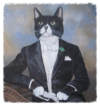Normally when an author says that a character was a 'cipher' for them, they mean s/he was a stand in for them. Much like a code or a key to break that code, the cipher holds keys to the author's inner feelings and motivations. But in Noir, it's slightly different. There a cipher is a mystery. On his own, the character is devoid of meaning, directionless and of no interest. But placed within the right milieu, he becomes the key to unlocking the tale. These characters exist in all tales to some degree. Henry from The End of the Affair comes immediately to mind. on his own he is genial, harmless, upstanding and completely boring. But hold him up to Maurice, and he becomes the key to understanding Maurice's actions. In fact he's the key for Maurice to understand himself.
Noir takes this up a notch. Often the cipher is the main character himself. Rarely, if ever will a good Noir lead detective, insurance agent or cop talk about himself. He will give up nothing in confidence. He wont get chatty, or have a good heart-to-heart with anybody, even his best friend or former boss. After all, information is often more valuable than gold and more deadly than a Colt. What little information the reader gleans about them (decorated war vet, bounced out of the force, divorced, tall, drunk) comes solely from the observations of other participants in the story.
The only trait you can gather from these ciphers can usually be boiled down to one thing, and that thing varies. Dashiell Hammett's Continental Op doesn't like to be lied to. Phillip Marlowe cannot stand authority. Marlowe, who appeared in 8 full-length novels and 4 short stories, was described so sparely that his wikipedia page has only 3 paragraphs describing the man. Even this tends to focus on how he drank his coffee (cream in the morning, black during the day) and what cigarettes he smoked (camels).
So why are the great Noir characters ciphers? Or, more to the point, why is Marlowe's background, for example, so inconsequential while Sherlock Holmes' is so important? Holmes solves crimes in a most amazing way, one that would be unbelievable without Watson to both explain his machinations and how he became such a human computer. But a good Noir detective needs only a distrusting nature, a flexible sense of the law and an understandable moral compass. Whereas the reader is supposed to identify with John Watson while reading The Speckled Band, he is supposed to identify with Philip Marlowe when reading Chandler. If you're short, fat and have bad acne, so too could the main character be. What matters is he is quick with a quip, can take a good punch and gets to the bottom of the crime.
Once the main character's motivations have been defined, the less said about them the better. My character Detective Cameron Knox from Mother of Pearl is vague enough you don't know if he's black or white. That is how I would have it. You understand his motivations, you understand his sense of self-loathing, you relate to his arrogance because you can recognize it's a defense mechanism. But you don't know if he went to college, or served in the military or has brothers or sisters. And why should you? I want you to relate to him through his actions, not through his self-evaluations. These tidbits of information are entanglements to the story for the reader and within the story, they'd be entanglements for the characters. Knowledge is a weapon, used over and over within the genre. The second you become too close to a partner, a client or a love interest, or share private information, it becomes an asset that must be protected lest it be taken and used against you.
Besides, how good would a hard-boiled detective novel be if the main character spent pages wallowing in self pity and examining his motivations a la Rob Fleming in High Fidelity (no knock to Nick Hornby, that's a fantastic book)? Just as Rob Fleming is a product (mostly) of the 80's so too are these men and women products of their times. There's no space for moral ambiguity while charging a rat hole on Iwo Jima, and there's no time to look back in a Los Angeles that is barreling into the future at a break-neck pace. To stop and reflect on life's finer moments would get you a bullet in the head or steamroll you under a 6 lane highway.
This is why Noir will never go out of style. The characters never age because they are a cipher for you. I see in Marlowe what I think I would see in myself were I alive in LA in the 40's. And I could see a Marlowe working now. There are just as many corrupt cops and bought politicians today, only more so because it happens not just at a municipal level, but on a worldwide scale. And the plot devices are there because the future never stops coming. 10 years ago your phone was mobile, but it was still a phone. Now your phone can tell you what star that is in the sky just by pointing at it or translate what you say into Swahili, but it also an tell anybody with enough money, clout or connections everything they want to know about you and your habits.
Here's to a bright future of morally ambiguous, rule-bending ciphers. Characters that won't even share the slightest detail with us, even when we're buying the drinks. Characters that will let us lover them but will never love us back. In a world where the government thinks everyone is a spy and corporations go unchecked in search of the almighty dollar, we are going to need every last quiet dirty cop, private dick and Pinkerton that can take a punch and keep their mouth shut.

